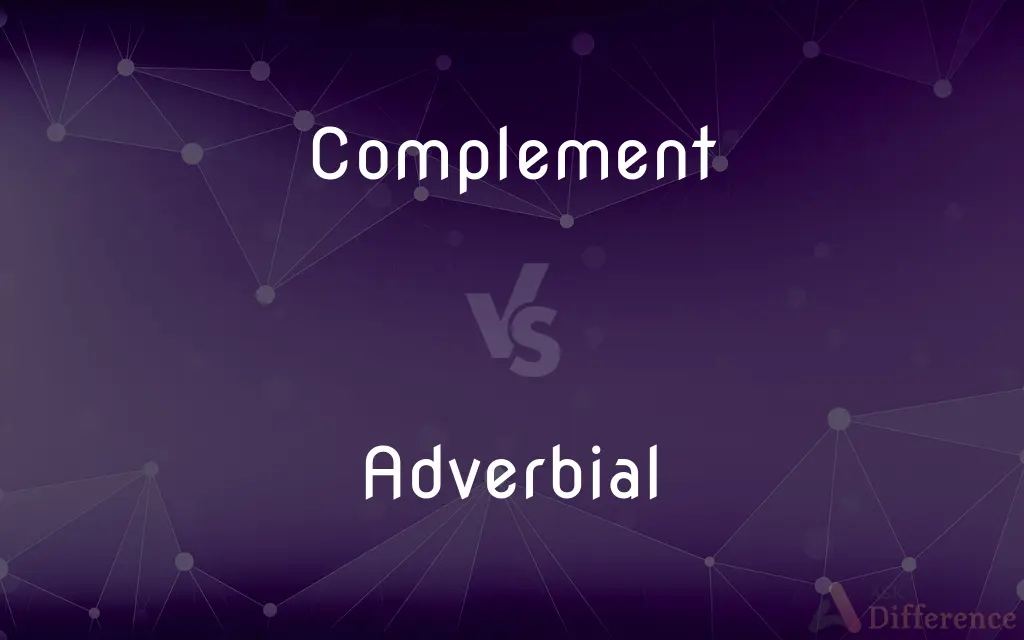Complement vs. Adverbial — What's the Difference?
By Fiza Rafique & Maham Liaqat — Updated on March 8, 2024
Complements complete the meaning of a sentence or clause, typically necessary for grammatical completeness, while adverbials modify verbs, adjectives, or other adverbs, adding detail about how, when, where, or why an action occurs.

Difference Between Complement and Adverbial
Table of Contents
ADVERTISEMENT
Key Differences
Complements are essential elements in a sentence that provide complete information about the subject or object. They can be nouns, pronouns, or adjective phrases that directly link to the subject or verb to give a full sense of the sentence. Adverbials, however, are modifiers that provide additional context but are not necessary for the sentence's grammatical completeness. They can appear as adverbs, prepositional phrases, or even clauses, offering details about the circumstances of an action.
In terms of function, complements serve to complete a predicate or enhance the subject, making sentences clear and meaningful. Without a complement, sentences with certain verbs (like 'to be' or 'seem') might feel incomplete or lacking in information. Adverbials, on the other hand, add layers of meaning by describing how, where, when, or why something happens, but if removed, the core statement remains grammatically intact.
The position in a sentence also differentiates complements from adverbials. Complements usually follow the verb or the object they are complementing and are closely tied to them. Adverbials are more flexible and can be placed at the beginning, middle, or end of a sentence, depending on what they are modifying and the emphasis the speaker wants to convey.
Understanding the distinction between complements and adverbials can greatly enhance one's grasp of sentence structure and the nuanced ways in which information is conveyed in language.
Comparison Chart
Definition
An essential element that completes the meaning of a sentence or clause.
A modifier that adds information about how, when, where, or why an action occurs.
ADVERTISEMENT
Function
Provides necessary information about the subject or object, completing a predicate.
Modifies verbs, adjectives, or other adverbs, offering additional context but not essential for grammatical completeness.
Examples
"She is a teacher." (completes the subject 'She')
"She teaches passionately." (modifies the verb 'teaches')
Position
Typically follows the verb or object it complements and is closely tied to them.
Can be placed flexibly within the sentence (beginning, middle, end) depending on emphasis.
Grammatical Role
Essential for the sentence's completeness and meaning.
Adds layers of meaning but the sentence remains grammatically correct if removed.
Compare with Definitions
Complement
A word or phrase needed to complete the meaning of a sentence.
He became a doctor.
Adverbial
A word or phrase that modifies a verb, adjective, or adverb.
She sings beautifully.
Complement
An element that gives additional information about the subject or object.
The results seem inconclusive.
Adverbial
An element providing context such as time, place, manner, or reason.
He arrived in the morning.
Complement
A noun, pronoun, or adjective that directly links to the subject or verb.
She is the manager of the team.
Adverbial
An optional part of a sentence adding detail but not necessary for completeness.
She works from home.
Complement
A necessary part of a sentence that enhances its meaning.
The sky is blue.
Adverbial
A flexible part of a sentence that can be moved without altering grammatical correctness.
Suddenly, the lights went out.
Complement
A phrase that completes the predicate in a sentence.
They named their daughter Emma.
Adverbial
A modifier that can be a single word, a phrase, or a clause.
To stay healthy, she exercises daily.
Complement
Something that completes, makes up a whole, or brings to perfection
A sauce that is a fine complement to fish.
Adverbial
In grammar, an adverbial (abbreviated adv) is a word (an adverb) or a group of words (an adverbial clause or adverbial phrase) that modifies or more closely defines the sentence or the verb. (The word adverbial itself is also used as an adjective, meaning "having the same function as an adverb".) Look at the examples below: Danny speaks fluently.
Complement
The quantity or number needed to make up a whole
Shelves with a full complement of books.
Adverbial
A word or phrase functioning as a major clause constituent and typically expressing place (in the garden), time (in May), or manner (in a strange way).
Complement
The full crew of personnel required to run a ship.
Adverbial
Relating to or functioning as an adverb or adverbial.
Complement
Either of two parts that complete the whole or mutually complete each other.
Adverbial
Of, relating to, or being an adverb.
Complement
An angle related to another so that the sum of their measures is 90°.
Adverbial
An adverbial element or phrase.
Complement
(Grammar) A word or words used to complete a predicate construction, especially the object or indirect object of a verb, for example, the phrase to eat ice cream in We like to eat ice cream.
Adverbial
(grammar) Of or relating to an adverb.
Complement
(Music) An interval that completes an octave when added to a given interval.
Adverbial
(grammar) An adverbial word or phrase.
Complement
Mathematics & Logic For a universal set, the set of all elements in the set that are not in a specified subset.
Adverbial
Of or pertaining to an adverb; of the nature of an adverb; as, an adverbial phrase or form.
Complement
A complementary color.
Adverbial
A word or group of words function as an adverb
Complement
To serve as a complement to
Roses in a silver bowl complement the handsome cherry table.
Adverbial
Of or relating to or functioning as an adverb;
Adverbial syntax
Complement
Something (or someone) that completes; the consummation.
Complement
(obsolete) The act of completing something, or the fact of being complete; completion, completeness, fulfilment.
Complement
The totality, the full amount or number which completes something.
Complement
(obsolete) Something which completes one's equipment, dress etc.; an accessory.
Complement
(nautical) The whole working force of a vessel.
Complement
(heraldry) Fullness (of the moon).
Complement
An angle which, together with a given angle, makes a right angle.
Complement
Something which completes, something which combines with something else to make up a complete whole; loosely, something perceived to be a harmonious or desirable partner or addition.
Complement
A word or group of words that completes a grammatical construction in the predicate and that describes or is identified with the subject or object.
Complement
(music) An interval which, together with the given interval, makes an octave.
Complement
(optics) The color which, when mixed with the given color, gives black (for mixing pigments) or white (for mixing light).
The complement of blue is orange.
Complement
(set theory) Given two sets, the set containing one set's elements that are not members of the other set (whether a relative complement or an absolute complement).
The complement of the odd numbers is the even numbers, relative to the natural numbers.
Complement
(logic) An expression related to some other expression such that it is true under the same conditions that make other false, and vice versa.
Complement
(electronics) A voltage level with the opposite logical sense to the given one.
Complement
(computing) A bit with the opposite value to the given one; the logical complement of a number.
Complement
The diminished radix complement of a number; the nines' complement of a decimal number; the ones' complement of a binary number.
The complement of is .
Complement
The radix complement of a number; the two's complement of a binary number.
The complement of is .
Complement
The numeric complement of a number.
The complement of −123 is 123.
Complement
(genetics) A nucleotide sequence in which each base is replaced by the complementary base of the given sequence: adenine (A) by thymine (T) or uracil (U), cytosine (C) by guanine (G), and vice versa.
A DNA molecule is formed from two strands, each of which is the complement of the other.
Complement
(biochemistry) alexin
Complement
(economics) complementary good
Complement
To complete, to bring to perfection, to make whole.
We believe your addition will complement the team.
Complement
To provide what the partner lacks and lack what the partner provides, thus forming part of a whole.
The flavors of the pepper and garlic complement each other, giving a very rich taste in combination.
I believe our talents really complement each other.
Complement
To change a voltage, number, color, etc. to its complement.
Complement
(obsolete) Old form of compliment
Complement
That which fills up or completes; the quantity or number required to fill a thing or make it complete.
Complement
That which is required to supply a deficiency, or to complete a symmetrical whole.
History is the complement of poetry.
Complement
Full quantity, number, or amount; a complete set; completeness.
To exceed his complement and number appointed him which was one hundred and twenty persons.
Complement
A second quantity added to a given quantity to make it equal to a third given quantity.
Complement
Something added for ornamentation; an accessory.
Without vain art or curious complements.
Complement
The whole working force of a vessel.
Complement
The interval wanting to complete the octave; - the fourth is the complement of the fifth, the sixth of the third.
Complement
A compliment.
Complement
To supply a lack; to supplement.
Complement
To compliment.
Complement
A word or phrase used to complete a grammatical construction
Complement
A complete number or quantity;
A full complement
Complement
Number needed to make up whole force;
A full complement of workers
Complement
Something added to complete or make perfect;
A fine wine is a perfect complement to the dinner
Complement
Either of two parts that mutually complete each other
Complement
Make complete or perfect; supply what is wanting or form the complement to;
I need some pepper to complement the sweet touch in the soup
Common Curiosities
What is the main role of a complement in a sentence?
A complement is crucial for completing the meaning of a sentence, often providing necessary information about the subject or object.
Is a complement always required in a sentence?
Not all sentences require complements; their necessity depends on the verb and the overall sentence structure.
Can a sentence have both a complement and an adverbial?
Yes, a sentence can include both, with the complement completing the sentence's meaning and the adverbial adding extra information.
How does the position of an adverbial in a sentence affect its meaning?
The placement can emphasize different aspects of the action or situation described, though the core meaning generally remains the same.
Are adverbials always adverbs?
No, adverbials can be adverbs, prepositional phrases, or even clauses, as long as they modify a verb, adjective, or another adverb.
Are adverbials optional in sentence construction?
Adverbials are optional and can be added or removed without affecting the grammatical completeness of a sentence.
Can a phrase be both a complement and an adverbial?
Generally, a phrase serves as either a complement or an adverbial based on its role in the sentence, but some phrases might be ambiguous without context.
How do complements and adverbials differ in terms of modification?
Complements don't modify but rather complete the sentence, while adverbials specifically modify verbs, adjectives, or other adverbs.
Do complements always follow the verb they complement?
Typically, yes, but in some sentence structures, they might precede the verb or be separated from it by other elements.
Can the removal of a complement change the grammatical correctness of a sentence?
Removing a complement can often render a sentence incomplete or grammatically incorrect, especially with certain verbs.
Share Your Discovery

Previous Comparison
Create vs. Invent
Next Comparison
Utilize vs. UseAuthor Spotlight
Written by
Fiza RafiqueFiza Rafique is a skilled content writer at AskDifference.com, where she meticulously refines and enhances written pieces. Drawing from her vast editorial expertise, Fiza ensures clarity, accuracy, and precision in every article. Passionate about language, she continually seeks to elevate the quality of content for readers worldwide.
Co-written by
Maham Liaqat














































